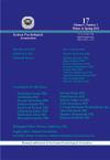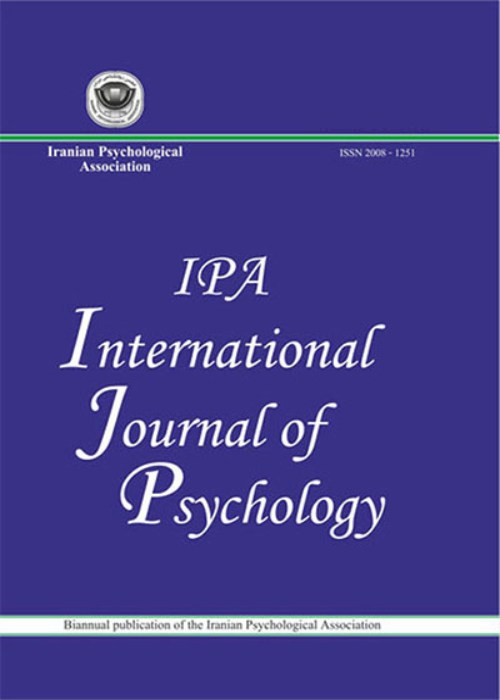فهرست مطالب

International Journal of Psychology
Volume:10 Issue: 2, Summer-Fall 2016
- تاریخ انتشار: 1395/08/05
- تعداد عناوین: 8
-
-
Page 1This study was conducted to examine the effectiveness of the cognitive emotion regulation group training on mental health of adolescent girls with symptoms of premenstrual syndrome in Kerman, Iran. (The research method was a Two-Group Experimental Design with pretest-posttest). In order to examine premenstrual symptoms we used the PMS Questionnaire and for assessing mental health Goldbergs mental health Questionnaire (GHQ-28) was used. The statistical population of the research was120 adolescents girl, aged 13 to 18 years, with premenstrual syndrome inone of Kerman citys High Schools (District one) in the 2013-2014 academic year. First,120 girls with premenstrual syndrome were assessed based on secondary screening by mental healthand then 78 adolescent girls having lower scores on the Mental health Questionnaire were selected and placed in two 39-person experimental and control groups by the random sampling method. Cognitive emotionregulation group training was conducted on the experimental group during 8 sessions. Then the subjects were administered the post-test, a month later. Statistical analysis was conducted by multivariate analysis of covariance (MANCOVA). Thegroup training showed meaningful difference in general health between the two groups. So, cognitive emotion regulation group training can increase mental health in adolescent girls with PMS.Keywords: cognitive emotion regulation, premenstrual syndrome, mental health
-
Page 17Attention Deficit Hyperactivity Disorder (ADHD) is one of the most common behavioral disorders in children. The current study investigated the effects of sports, play, and active recreation in children (SPARK) program on reducing the behavioral problems of children with ADHD. In order to conduct the experiment, the participants (n=30) were randomly assigned into an experimental group and a control group. Child Behavior Checklist (CBCL) was administered to both groups. Then, the experimental group received SPARK program for 12 sessions of 30 minutes, while the control group received no training. At the end of the sessions, both groups were assessed once more. Findings demonstrated that the groups were not very different in the pretest stage; but, post-test scores revealed a significant difference between the groups. This implies the efficacy of doing exercise and physical activities on reducing the behavioral problems of the experimental group members. Therefore, it seems that physical activities should be put into focus in schools and educational centers in order to pave the way for designing therapeutic programs for ADHD children. It is recommended that administrators, trainers, and parents provide suitable environments for ADHD children to help them improve their behaviors.Keywords: SPARK, behavioral problems, ADHD, hyperactivity
-
Page 33The present study investigates the effects of life skills training on the mental health and locus of control of hearing impaired female students. The population of the study included 90 female secondary school students at the Kerman Farzaneh Educational Center, out of which 80 students were randomly selected and assigned to two groups of 40 (control and experimental groups). After taking the Goldberg General Health Questionnaire and Levensons self-report measure for assessing locus of control, the 40 participants in the experimental group were divided into four groups of 10 and were given treatment (life skills training). Participants in both the experimental and control groups completed the questionnaires after the training phase again. Results indicated that while life skills training led to the improved general health of deaf students (pKeywords: life skills, general health, locus of control, deaf students
-
Page 55The present study is aimed at investigating the relationship between servant leadership and organizational commitment by considering the mediating role of psychological empowerment and organizational justice. This study uses a correlative research method through structural equation modeling (SEM). 250 employees of Maroun Oil and Gas Operating Company were selected by the simple random sampling method. Measures of this research include servant leadership questionnaires, psychological empowerment questionnaire, organizational justice questionnaire, and organizational commitment questionnaire. Data is analyzed through structural equation modeling (SEM) and intermediate analysis. Analyses of structural equation modeling supported the fitness of the proposed model with the data. The results indicated the positive effect of servant leadership on organizational commitment and indirect positive effect of this relationship through psychological empowerment and organizational justice. It can be concluded that organizations may increase a sense of capability and perceived organizational justice in employees through the servant leadership style in the organization and enjoy the final result, i.e. committed employees.Keywords: servant leadership, organizational commitment, psychological empowerment, organizational justice
-
Page 82
The dynamics of human relationships have made researchers study the factors that affect marriage stability in families. Focus on interpersonal behaviour as a preventive and therapeutic action to decrease marital instability led to the assumption that the characteristics of individual spouses play important roles in the marital outcomes of. However, there is increasing interest in the role of pro-relationship behaviors in repairing and maintaining couples relationships. This paper is studying the predictive role of interpersonal forgiveness to decrease marital instability among married women andand men. To reach this purpose three hundreds andand eighty four married people (192 males and 192 females) from five different regions across Qazvin City were selected by multistage cluster sampling. They answered 14-item marital instability scale by Edwards et. al. and 40-item Family Forgiveness Scale of Seif andand Bahari (FFS). The result from administrating the Pearson's correlation test and analysis of stepwise regression showed a strong negative correlation between marital instability with general and and marital forgiveness, also, the negative correlation between marital instability and the stages of forgiveness was observed. The results show that forgiveness in marital relationship generally, and resolution andand understanding as two stages of forgiveness can predict the marital instability of married men. Also, the predictive role of marital forgiveness in the marital instability of married women was confirmed.
Keywords: marital forgiveness, marital instability, Qazvin -
Page 105The aim of this study was to examine the effects of yoga exercises on three dimensions of mental health: meaning in life, gratitude and marital intimacy. The population consisted of married women between the ages 20-55 years from the city of Kermanshah. The participants had high school diplomas and higher education. The research design was pre-test and post-test with a control group. Forty subjects were selected randomly among the volunteers participating in yoga classes in Mersad, Kosar and Shohada sports facilities. The subjects were randomly assigned in two groups: Yoga Group and Control Group. The Yoga Group participated in yoga sessions for two days a week (12 sessions and each session was for 90 minutes). Each yoga session consisted of 10 minutes in awareness rotation, 15 minutes of stretching, 45 minutes asana and 20 minutes of shavasana and the Control Group did not participate in any sessions. All the participants were evaluated via the Meaning of Life Questionnaire (MLQ), Gratitude Questionnaire (GQ-6) and Intimacy Scale (IS). The statistical method of covariance was used to analyze the data. The results of covariance analysis showed that there were significant differences between the two groups. The meaning of life, gratitude and intimacy in the experimental group were increased significantly (p˂0.1) after 12 sessions of yoga training. In conclusion, the yoga exercise had positive effects on meaning in life, gratitude and intimacy. Likewise, yoga exercises reflect the holistic benefits of well-being experienced by those who practiced yoga. Therefore, the prevalence of this practice by psychotherapists as well as in settings such as schools and universities and offices is recommended. Therefore, the prevalence of this practice from psychotherapists point of view is to recommend having such a yoga program in schools, universities and offices.Keywords: Yoga, Meaning in Life, Gratitude, intimacy
-
Page 127This study was designed to assess the effect of training self-awareness skills on the self-compassion of girl students in Ahvaz high schools for gifted students. This study was conducted using multi-step random sampling including 30 girl students in two groups of experimental (n=15) and control (n=15). The self-compassion questionnaire was the tool of the study. The one way ANCOVA test was used for the analysis of the data. Two groups filled the questionnaire at the pre-test and post-test stages. The experimental group underwent eight sessions of training about self-awareness skills during two months. The results of the study showed that self-awareness training had effects on self-compassion. After a month at the follow-up stage, the results were stable which indicated the stability of the effect of the self-awareness training on self-compassion.Keywords: self, awareness, gifted students, self, compassion, high school
-
Page 140This study aimed at the analysis of the relationship of organizational trust and organizational justice with organizational citizenship behavior of teachers with chain mediation of job stress and emotional exhaustion. To this end, 170 female teachers were selected from public schools in Ilam using the multistage random sampling method. Research instruments were as follow: teachers organizational citizenship behavior questionnaire, organizational trust questionnaire, organizational justice, job stress and emotional exhaustion. Results using structural equation modeling confirmed the fitness of the hypothesized model and revealed that organizational trust ( =.46, p= .04), and organizational justice ( = .70, p= .03) directly influence the organizational citizenship behavior of teachers. Analysis of mediating relationships using the bootstrap method indicated that, job stress and emotional exhaustion do not play a chain mediation role in the relationship between organizational trust ( = .019, p= .12) and organizational justice ( = .04, p= .15) with organizational citizenship behavior of teachers. Finally, these findings based on theories such as social exchange and equity have been discussed.Keywords: teacher's organizational citizenship behavior, organizational trust, organizational justice, job stress, emotional exhaustion


